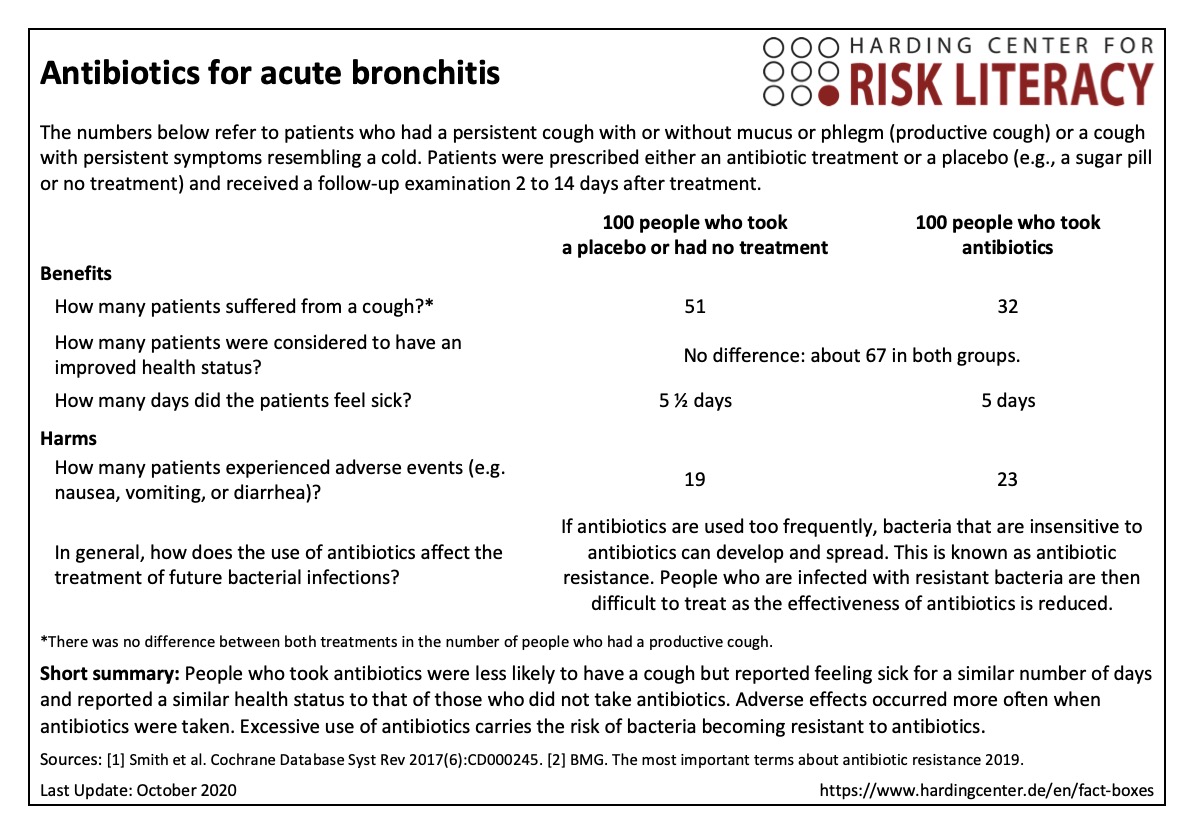This fact box will help you to weigh the benefits and harms of taking antibiotics as a treatment for acute bronchitis. The information and numbers are based on the best scientific evidence currently available.
The fact box was developed by the Harding Center for Risk Literacy.
Acute bronchitis is a temporary inflammation of the lower respiratory tracts (bronchia). The inflammation is caused either by bacteria or by viruses. Most often itisdue to cold viruses, which iswhy bronchitis often occurs duringor after a cold [2].
Beside the general symptoms of a common cold (e.g. slight body aches,a mild headache,or sore throat), the inflammation can cause fever and coughing. The coughing is often a wheezing cough with or without mucus or phlegm (productive cough). The symptoms usually last about two weeks, although the coughing can persist for up to eight weeks [1].
Antibiotics are among the most important drugs in the treatment of infectious diseases. They are effective at treating bacterial infections but ineffective at treating viruses.
By targeting all bacteria, antibiotics can also have a negative effecton naturally occurring bacteria, such as those in the intestine. As a result, antibiotics may cause diarrhea and nausea. In addition, some people may experience an allergic reaction. Overuse of antibiotics leads to bacteria becoming resistant to them [3].
Children and adults who suffer from persistent coughing with or without sputum (phlegmor mucus), who receive a diagnosis of “acute bronchitis,” or who suffer from coughing with persistent symptoms resembling a cold or the flu. Inmost cases, however, acute bronchitis resolves on its own [2].
A medical examination cannot differentiate between viral and bacterial causes for acute bronchitis. Since antibiotics can only help when bacteriaare responsible, the use of antibiotics for acute bronchitis is controversial [2].
An alternative is to rest and wait for symptoms to disappear. Painkillers, fever-reducing drugs, or cough expectorants (medicines that help bring up mucus from the lungs) can be used to alleviate symptoms.

The fact box shows the benefits and harms of antibiotics compared with a placebo or no treatment for acute bronchitis.
The table may be read as follows:
The health status of about 67 out of every 100 patients was considered to have improved, regardless of whether they had taken antibiotics or not.
The numbers in this fact box are rounded. They are calculated from 17 studies that included a total of about 5,099 participants [1].
| Alter 0-2 Jahre | Alter 3-7 Jahre | Alter 8-17 Jahre | Alter ab 18 Jahre | Chronisch Kranke | |
|---|---|---|---|---|---|
| Frauen | ? | (X) | X | X | - |
| Männer | ? | (X) | X | X | - |
Erklärung der Symbole: X = für diese Personen gelten die Zahlen in der Faktenbox; (X) = auf diese Personen lassen sich die Zahlen unter Vorbehalt anwenden (in solchen Fällen ist eine Rücksprache mit ärztlichem Personal empfehlenswert); - = für diese Personen gelten die Zahlen nicht; ? = es ist unbekannt, ob die Zahlen für diese Personen gelten
If the symptoms worsen, a visit to the doctor may be necessary in order to rule out a lung infection (pneumonia).
If antibiotics are used too frequently, bacteria that are insensitive to antibiotics can develop and spread. This is known as antibiotic resistance. People who are infected with resistant bacteria are then difficult to treat as the effectiveness of antibiotics is reduced.
The evidence was assessed by the authors of the review included. According to their assessment, the evidence is of overall high quality. It is very unlikely that further research will change the results [1].
- October 2020 (update of the accompanying text)
- September 2019 (update of the surrounding text, update of the research, no new evidence)
- December 2017 (update of the evidence)
- February 2014 (development)
Information within the fact box was obtained from the following sources:
[1] Smith SM, Fahey T, Smucny J, et al. Antibiotics for acute bronchitis. Cochrane Database Syst Rev 2017;6:CD000245. doi: 10.1002/14651858.CD000245.pub4.
[2] IQWiG. Akute Bronchitis 2017. [https://www.gesundheitsinformation.de/akute-bronchitis.2684.de.html] 26.07.2019.
[3] BMG. Die wichtigsten Begriffe zum Thema Antibiotika-Resistenzen 2019. [https://www.bundesgesundheitsministerium.de/themen/praevention/antibiotika-resistenzen/die-wichtigsten-begriffe.html] 01.08.2019.
Documentation on how the numbers in the fact box were determined is available on request.
